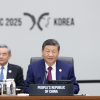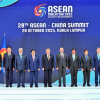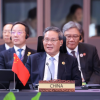热词翻译:““集团政治”、“势力范围””英文怎么说?
““集团政治”、“势力范围””英文怎么说?
根据热词译领导讲话翻译数据库,在《从和平共处到命运与共的历史跨越》的翻译中,““集团政治”、“势力范围””被翻译为:
“集团政治”、“势力范围”
bloc politics and sphere of influence
bloc politics and sphere of influence
例句如下:
从现实逻辑看,这是团结世界上一切进步力量、共同应对全球挑战的迫切需要。和平共处五项原则汲取热战教训,冲破冷战阴云,超越“集团政治”、“势力范围”等陈旧狭隘观念,倡导各国相互信任和友好合作,坚持以和平方式解决争端,有力促进了世界和平与发展事业。今天,人类生活在同一个地球村,各国相互联系、相互依存的程度空前加深。世界进入新的动荡变革期,不稳定性不确定性明显上升。不论是乌克兰危机、巴以冲突等热点问题,还是气候变化、网络安全等全球性挑战,世界上没有哪个国家能够独善其身,更不可能通过单打独斗或者搞阵营化“小圈子”解决问题。新形势下弘扬和平共处五项原则精神内涵,是推动各国团结合作,共迎挑战、共创未来的必然选择。
From a realistic perspective, it is a response to the urgent call for uniting all progressive forces across the world and tackling global challenges together. The Five Principles drew lessons from the hot wars, broke through the dark clouds of the Cold War, and triumphed over obsolete and narrow-minded ideas such as bloc politics and sphere of influence. They advocated mutual trust, friendship and cooperation between all countries, called for peaceful settlement of disputes, and greatly advanced the cause of world peace and development. Today, humanity lives in a global village, and countries are more interconnected and interdependent than ever before. The world has entered a new period of turbulence and change, where factors of instability and uncertainty are notably increasing. Facing hotspot issues such as the Ukraine crisis and the Palestinian-Israeli conflict, and global challenges like climate change and cybersecurity, no country can stay insulated from their impact, still less resolve them by going it alone or resorting to exclusive blocs. Championing the essence of the Five Principles under the new circumstances is an inevitable choice for enhancing solidarity and cooperation among all countries to meet challenges and build a better future together.
From a realistic perspective, it is a response to the urgent call for uniting all progressive forces across the world and tackling global challenges together. The Five Principles drew lessons from the hot wars, broke through the dark clouds of the Cold War, and triumphed over obsolete and narrow-minded ideas such as bloc politics and sphere of influence. They advocated mutual trust, friendship and cooperation between all countries, called for peaceful settlement of disputes, and greatly advanced the cause of world peace and development. Today, humanity lives in a global village, and countries are more interconnected and interdependent than ever before. The world has entered a new period of turbulence and change, where factors of instability and uncertainty are notably increasing. Facing hotspot issues such as the Ukraine crisis and the Palestinian-Israeli conflict, and global challenges like climate change and cybersecurity, no country can stay insulated from their impact, still less resolve them by going it alone or resorting to exclusive blocs. Championing the essence of the Five Principles under the new circumstances is an inevitable choice for enhancing solidarity and cooperation among all countries to meet challenges and build a better future together.
热词链接
““集团政治”、“势力范围””在其他来源中的翻译:
1 《弘扬和平共处五项原则 携手构建人类命运共同体》中““集团政治”、“势力范围””的翻译
第二,和平共处五项原则为不同社会制度国家建立和发展关系提供了正确指导。凡是遵循五项原则,即使社会制度和意识形态不同、历史文化和宗教信仰不同、发展水平和体量规模不同的国家,也完全可以建立和发展相互信任和友好合作的关系。五项原则为和平解决国家间历史遗留问题及国际争端开辟了崭新道路,超越了“集团政治”、“势力范围”等陈旧狭隘观念和对立对抗思维。
Second, the Five Principles of Peaceful Coexistence have served as the prime guidance for the establishment and development of relations between countries with different social systems. When following the Five Principles, even countries that differ from each other in social system, ideology, history, culture, faith, development stage, and size can build a relationship of mutual trust, friendship and cooperation. The Five Principles offer a new path toward peaceful settlement of historic issues and international disputes, triumphing over obsolete, narrow-minded, antagonistic and confrontational mindsets such as bloc politics and sphere of influence.
Second, the Five Principles of Peaceful Coexistence have served as the prime guidance for the establishment and development of relations between countries with different social systems. When following the Five Principles, even countries that differ from each other in social system, ideology, history, culture, faith, development stage, and size can build a relationship of mutual trust, friendship and cooperation. The Five Principles offer a new path toward peaceful settlement of historic issues and international disputes, triumphing over obsolete, narrow-minded, antagonistic and confrontational mindsets such as bloc politics and sphere of influence.

 国家主席习近平发表二〇二六年新年贺词
国家主席习近平发表二〇二六年新年贺词 在历史演进重大关头开拓中国特色大国外交新境界
在历史演进重大关头开拓中国特色大国外交新境界 习近平在亚太经合组织第三十二次领导人非正式会议第一阶段会议上的讲话
习近平在亚太经合组织第三十二次领导人非正式会议第一阶段会议上的讲话 李强在第28次中国—东盟领导人会议上的讲话
李强在第28次中国—东盟领导人会议上的讲话 李强在第20届东亚峰会上的讲话
李强在第20届东亚峰会上的讲话